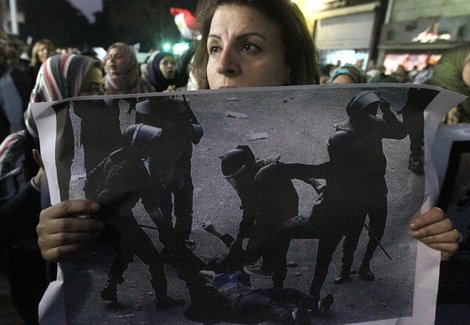By Heba Fahmy
CAIRO: Around 400 detainees arrested during the revolution remain in custody and around 40 are missing, according to executive director of the Arab Network for Human Rights Information (ANHRI), Gamal Eid.
“We tried to contact the army to discuss the release of the remaining detainees, but we received no response,” Eid told Daily News Egypt.
The director of moral affairs in the armed forces, General Ismail Etman, said in a phone interception on national TV show “Masr Ennaharda” (Egypt Today) this week that all the remaining detainees were looters and thugs.
He said, however, that the army would investigate the issue once it receives a list of detainees from activists.
“Even if we presume that the detainees remaining in prison are thugs, their families still deserve to know their whereabouts and official criminal charges should be filed against them if there are in fact any,” Eid added.
However, director of the Egyptian Organization for Human Rights (EOHR), Hafez Abou Saeda, stated on the EOHR official website that the confirmed number of detainees who remain in custody is 11, and the number of missing since Jan. 25 is 43.
Abou Saeda demanded in a statement issued on Wednesday that all the prisoners be released. He added that they should be guaranteed respect for their basic human rights and dignity while they’re in custody.
Abou Saeda is a member of the National Council for Human Rights which met with Prime Minister Ahmed Shafiq earlier this week to discuss the situation of the detainees.
Shafiq vowed that they would all be released immediately, reiterating a promise he had made on Sunday at the first press conference he held after the ouster of president Hosni Mubarak.
The Front for Defending Egyptian Protestors (FDEP) website published some names and information about those detained and missing.
The detainees were arrested between Jan. 25 and Feb. 6, according to the website.
The website cited one of the detainees as Ahmed Saeid, a medical student who was delivering blankets to the protestors in Tahrir Square. Mohamed Al-Ashkar was detained by military police on Jan. 30 while heading back to his home in Giza from Tahrir Square.
Amnesty International’s director for the Middle East and North Africa, Malcolm Smart also urged Egypt’s military to immediately release all detainees or charge them with official criminal offenses, in a statement issued on Thursday.
Smart added that the names and whereabouts of all detainees must be disclosed to the public. The statement accused the military of using “torture and ill treatment” against the detainees.
“The military authorities must intervene to end torture and other abuse of detainees, which we now know to have been taking place in military custody,” Smart said.
The statement cited released detainees who told Amnesty that they were tortured through different methods including “whipping and electric shock” while in military custody, only a couple of days before the ousted Mubarak stepped down.
Eid confirmed Amnesty’s claims. “We heard testimonies of released detainees who said people were disfigured from the amount of torture they were subjected to in military prisons.”
Amnesty published the detailed testimonies of released prisoners who were tortured by soldiers.
A 29-year-old decorator from Gharbiya told Amnesty International he was tortured by soldiers on Feb 3.
“They called me a traitor and a foreign agent and forced me to take off my clothes except my underwear and to lie face down on the floor,” he said. “Then they beat me with a whip and stepped with boots on my back and on my hands.”
He added that he was later beaten unconscious with a chair by a soldier.
An 18-year-old student from Cairo also told Amnesty he was tortured at an unknown location after being arrested by soldiers near Tahrir Square on Feb. 3.
“They put a chain or rope to my legs and lifted me up — so that my head was hanging down. From time to time they would let me down into a barrel that was filled with water,” he said.
The soldiers ordered him to confess that he was trained by Israel or by Iran and put electric shocks to his body until he fainted.
The April 6 Youth Movement weighed in on accusations against the army accusing it of stalling and not responding to the people’s demands including the immediate release of all detainees, in a statement issued on Thursday.
“The Supreme Council of the Armed Forces has ignored the revolutionaries’ demands and [has yet to remove] the roots of corruption [in Egypt],” the media spokesperson for the movement said in a statement.
